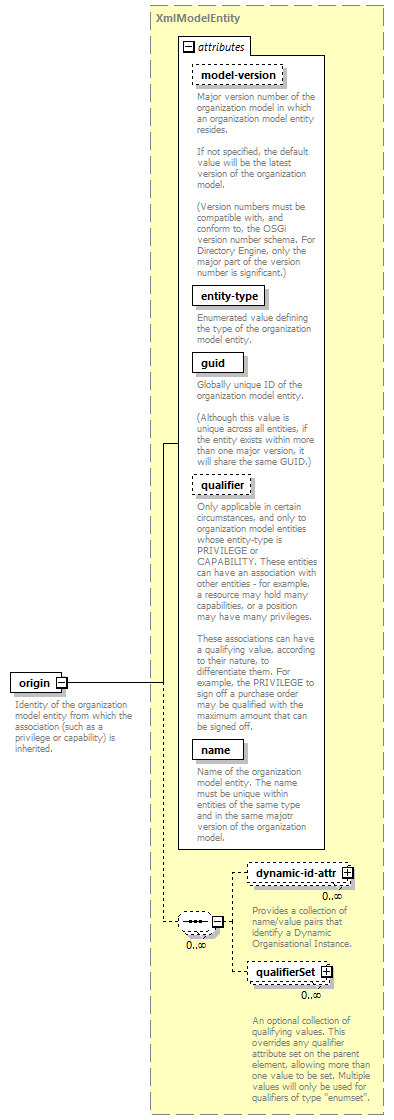| diagram |
 |
| namespace |
http://api.de.n2.tibco.com |
| type |
extension of XmlEntityAssociation |
| properties |
| base | XmlEntityAssociation |
|
| children |
dynamic-id-attr qualifierSet origin |
| attributes |
| Name | Type | Use | Default | Fixed | Annotation | | model-version | xs:int | optional | -1 | | | documentation | Major version number of the organization model in which an organization model entity resides.
If not specified, the default value will be the latest version of the organization model.
(Version numbers must be compatible with, and conform to, the OSGi version number schema. For Directory Engine, only the major part of the version number is significant.) |
| | entity-type | OrganisationalEntityType | required | | | | documentation | | Enumerated value defining the type of the organization model entity. |
| | guid | xs:string | required | | | | documentation | Globally unique ID of the organization model entity.
(Although this value is unique across all entities, if the entity exists within more than one major version, it will share the same GUID.) |
| | qualifier | xs:string | optional | | | | documentation | Only applicable in certain circumstances, and only to organization model entities whose entity-type is PRIVILEGE or CAPABILITY. These entities can have an association with other entities - for example, a resource may hold many capabilities, or a position may have many privileges.
These associations can have a qualifying value, according to their nature, to differentiate them. For example, the PRIVILEGE to sign off a purchase order may be qualified with the maximum amount that can be signed off. |
| | name | xs:string | required | | | | documentation | | Name of the organization model entity. The name must be unique within entities of the same type and in the same majotr version of the organization model. |
| | startDate | xs:dateTime | optional | | | | documentation | | Date/time at which the entity becomes available. |
| | endDate | xs:dateTime | optional | | | | documentation | | Date/time at which the entity becomes unavailable. |
|
|
| annotation |
| documentation | Details of an association (such as a privilege or capability) inherited by one organization model entity from another organization model entity (the origin) to which it is connected.
For example, details of the privileges inherited by a resource from the groups to which it belongs. |
|
| source |
<xs:complexType name="XmlInheritedAssociation">
<xs:annotation>
<xs:documentation>Details of an association (such as a privilege or capability) inherited by one organization model entity from another organization model entity (the origin) to which it is connected.
For example, details of the privileges inherited by a resource from the groups to which it belongs.</xs:documentation>
</xs:annotation>
<xs:complexContent>
<xs:extension base="XmlEntityAssociation">
<xs:sequence>
<xs:element name="origin" type="XmlModelEntity">
<xs:annotation>
<xs:documentation>Identity of the organization model entity from which the association (such as a privilege or capability) is inherited.</xs:documentation>
</xs:annotation>
</xs:element>
</xs:sequence>
</xs:extension>
</xs:complexContent>
</xs:complexType> |
| diagram |
 |
| type |
XmlModelEntity |
| properties |
|
| children |
dynamic-id-attr qualifierSet |
| attributes |
| Name | Type | Use | Default | Fixed | Annotation | | model-version | xs:int | optional | -1 | | | documentation | Major version number of the organization model in which an organization model entity resides.
If not specified, the default value will be the latest version of the organization model.
(Version numbers must be compatible with, and conform to, the OSGi version number schema. For Directory Engine, only the major part of the version number is significant.) |
| | entity-type | OrganisationalEntityType | required | | | | documentation | | Enumerated value defining the type of the organization model entity. |
| | guid | xs:string | required | | | | documentation | Globally unique ID of the organization model entity.
(Although this value is unique across all entities, if the entity exists within more than one major version, it will share the same GUID.) |
| | qualifier | xs:string | optional | | | | documentation | Only applicable in certain circumstances, and only to organization model entities whose entity-type is PRIVILEGE or CAPABILITY. These entities can have an association with other entities - for example, a resource may hold many capabilities, or a position may have many privileges.
These associations can have a qualifying value, according to their nature, to differentiate them. For example, the PRIVILEGE to sign off a purchase order may be qualified with the maximum amount that can be signed off. |
| | name | xs:string | required | | | | documentation | | Name of the organization model entity. The name must be unique within entities of the same type and in the same majotr version of the organization model. |
|
|
| annotation |
| documentation | | Identity of the organization model entity from which the association (such as a privilege or capability) is inherited. |
|
| source |
<xs:element name="origin" type="XmlModelEntity">
<xs:annotation>
<xs:documentation>Identity of the organization model entity from which the association (such as a privilege or capability) is inherited.</xs:documentation>
</xs:annotation>
</xs:element> |

